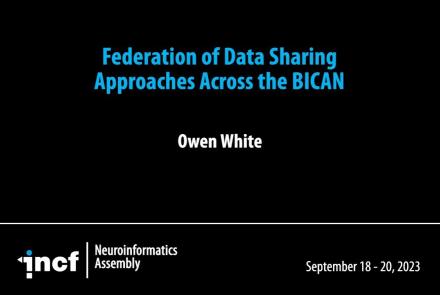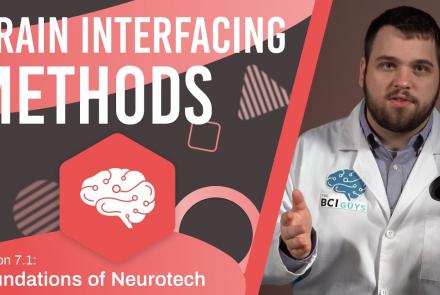Lesson type
Difficulty level
This lesson continues with the second workshop on reproducible science, focusing on additional open source tools for researchers and data scientists, such as the R programming language for data science, as well as associated tools like RStudio and R Markdown. Additionally, users are introduced to Python and iPython notebooks, Google Colab, and are given hands-on tutorials on how to create a Binder environment, as well as various containers in Docker and Singularity.
Difficulty level: Beginner
Duration: 1:16:04
Speaker: : Erin Dickie and Sejal Patel
This talk goes over Neurobagel, an open-source platform developed for improved dataset sharing and searching.
Difficulty level: Beginner
Duration: 13:37
Speaker: : Jean-Babtiste Poline
In this lesson, you will learn about the BRAIN Initiative Cell Atlas Network (BICAN) and how this project adopts a federated approach to data sharing.
Difficulty level: Beginner
Duration: 11:23
Speaker: : Owen White
In this second part of the lecture Data Science and Reproducibility, you will learn how to apply the awareness of the intersection between neuroscience and data science (discussed in part one) to an understanding of the current reproducibility crisis in biomedical science and neuroscience.
Difficulty level: Beginner
Duration: 31:31
Speaker: : Ashley Juavinett
This lecture covers the benefits and difficulties involved when re-using open datasets, and how metadata is important to the process.
Difficulty level: Beginner
Duration: 11:20
Speaker: : Elizabeth DuPre
This lesson provides a quick tour of some data repositories and how to download and manipulate data from them.
Difficulty level: Beginner
Duration: 00:49:06
Speaker: : Sebastian Urchs
Course:
KnowledgeSpace (KS) is a data discoverability portal and neuroscience encyclopedia that was developed to make it easier for the neuroscience community to find publicly available datasets that adhere to the FAIR Principles and to provide an integrated view of neuroscience concepts found in Wikipedia and NeuroLex linked with PubMed and 17 of the world's leading neuroscience repositories. In short, KS provides a single point of entry where reseaerchers can search for a neuroscience concept of interest and receive results that include: i. a description of the term found in Wikipedia/NeuroLex, ii. links to publicly available datasets related to the concept of interest, and iii. up-to-date references that support the concept of interests found in PubMed. APIs are available so that developers of other neuroscience research infrastructures can integrate KS components in their infrastructures. If your repository or your favorite repository is not indexed in KS, please contact us.
Difficulty level: Beginner
Duration: 6:14
Speaker: : Heather Topple
In this lesson, attendees will learn about the data structure standards, specifically the Brain Imaging Data Structure (BIDS), an INCF-endorsed standard for organizing, annotating, and describing data collected during neuroimaging experiments.
Difficulty level: Beginner
Duration: 21:56
Speaker: : Michael Schirner
This video provides a very quick introduction to some of the neuromorphic sensing devices, and how they offer unique, low-power applications.
Difficulty level: Intermediate
Duration: 2:37
Speaker: : Dan Goodman
This lecture covers the ethical implications of the use of brain-computer interfaces, brain-machine interfaces, and deep brain stimulation to enhance brain functions and was part of the Neuro Day Workshop held by the NeuroSchool of Aix Marseille University.
Difficulty level: Beginner
Duration: 1:02:00
Speaker: : Jens Clausen
Course:
In this module you will learn the basics of Brain Computer Interface (BCI). You will read an introduction to the different technologies available, the main components and steps required for BCI, associated safety and ethical issues, as well as an overview about the future of the field.
Difficulty level: Beginner
Duration: 11:02
Speaker: : Colin Fausnaught
Course:
In this module, users will learn about the different types of neurotechnology and how each of them works. This will be done through the metaphor of going to a symphony... in your brain. Like a symphony, brain processes emerge from collections of neural activity. This video encourages us to imagine ourselves moving to different areas in the concert hall to understand where different technologies interface. Once the concert ends, we talk about underlying neural mechanisms and technology that allow researchers and innovators to interact with the brain.
Difficulty level: Beginner
Duration: 10:49
Speaker: : Harrison Canning
Course:
This module addresses how neurotechnology is currently used for medical and non-medical applications, and how it might advance in the future.
Difficulty level: Beginner
Duration: 6:57
Speaker: : Colin Fausnaught
Course:
This module covers a brief history of the neurotechnology industry, bringing the history of brain-computer interfacing to life through engaging skits and stories.
Difficulty level: Beginner
Duration: 12:53
Speaker: : Colin Fausnaught
Course:
This module covers many types of invasive neurotechnology devices/interfaces for the central and peripheral nervous systems. Invasive neurotech devices are crucial, as they often provide the greatest accuracy and long-term use applicability.
Difficulty level: Beginner
Duration: 9:40
Speaker: : Colin Fausnaught
Course:
This module covers many of the types of non-invasive neurotech and neuroimaging devices including electroencephalography (EEG), electromyography (EMG), electroneurography (ENG), magnetoencephalography (MEG), and more.
Difficulty level: Beginner
Duration: 13:36
Speaker: : Harrison Canning
Course:
Neuromodulation refers to devices that influence the firing of neurons which can be useful in many medical applications. This modules covers what neuromodulation is, how it affects the functioning of neurons, and the many forms that these devices take on.
Difficulty level: Beginner
Duration: 12:18
Speaker: : Harrison Canning
Course:
This modules covers neuroprosthetic and cognitive enhancement devices that can help augment our capabilities by enhancing memory, as well as restoring or improving our senses.
Difficulty level: Beginner
Duration: 8:35
Speaker: : Colin Fausnaught
Course:
This module goes over the methods that neurotechnologists use to turn brain data into commands a computer or a machine can understand. We cover data collection, processing, filtering, analysis, how to generate an action in a device, asynchronous BCIs that use population encoding, and synchronous BCIs that use P300, SSVEP, N100, and N400 signals.
Difficulty level: Beginner
Duration: 14:47
Speaker: : Colin Fausnaught
Course:
This module covers the many things that brain-computer interfaces can and will be able to do, including motor neuroprosthetics like prosthetic arms, exosuits, and vehicle control, as well as computer and machine interfacing use-cases.
Difficulty level: Beginner
Duration: 16:39
Speaker: : Harrison Canning
Topics
- Artificial Intelligence (7)
- Philosophy of Science (5)
- Provenance (3)
- protein-protein interactions (1)
- Extracellular signaling (1)
- Animal models (8)
- Assembly 2021 (29)
- (-) Brain-hardware interfaces (14)
- Clinical neuroscience (40)
- International Brain Initiative (2)
- Repositories and science gateways (11)
- Resources (6)
- General neuroscience
(62)
- Neuroscience (11)
- Cognitive Science (7)
- Cell signaling (6)
- Brain networks (11)
- Glia (1)
- Electrophysiology (41)
- Learning and memory (5)
- Neuroanatomy (24)
- Neurobiology (16)
- Neurodegeneration (1)
- Neuroimmunology (1)
- Neural networks (15)
- Neurophysiology (27)
- Neuropharmacology (2)
- Neuronal plasticity (16)
- Synaptic plasticity (4)
- Visual system (12)
- Phenome (1)
- General neuroinformatics
(27)
- Computational neuroscience (279)
- Statistics (7)
- Computer Science (21)
- Genomics (34)
- Data science
(34)
- Open science (61)
- Project management (8)
- Education (4)
- Publishing (4)
- Neuroethics (42)




















